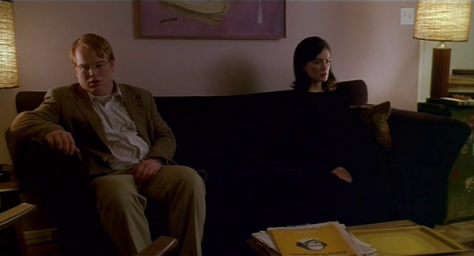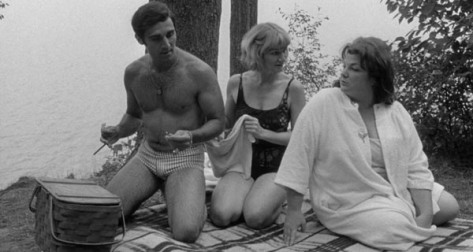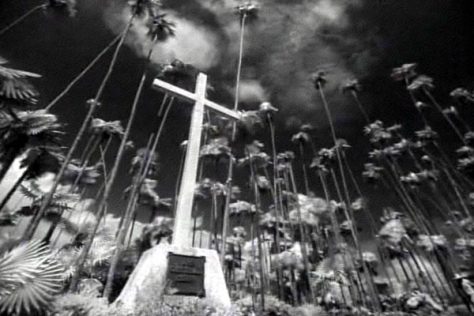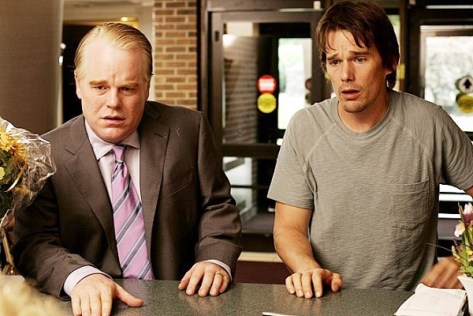By Dennis Hartley
(Originally posted on Digby’s Hullabaloo on March 5, 2016)

First off, there ain’t no such thing as an Easter Bunny, OK? And as much as we’d all like to believe in this new millennium of instant, “one-mouse-click-away” validation, there is no such thing as “overnight success” – especially in the music business. You may have heard of writer Malcolm Gladwell’s “10,000 hours of practice” rule, which is equated as the minimum investment of time and effort required to master a field? Well…it’s true.
Consider pseudo-glam shock rockers Twisted Sister (I know…it’s been a while since you have). They may have appeared to come from nowhere with their breakout hit (and MTV staple) “We’re Not Gonna Take It” in 1984, but by that time the band had already labored in the trenches (i.e., the Jersey/Connecticut/L.I./Westchester County circuit) for 12 years.
Those first 10,000 hours of dive bar stage time are chronicled in an entertaining (if slightly overlong at 135 minutes) documentary from Andrew Horn called We Are Twisted Fucking Sister! (just out on DVD and Blu-ray). Horn begins in 1972, which is when longest-running member, NYC-based guitarist Jay-Jay French, joins a glitter band from New Jersey who called themselves Silver Star.
They become Twisted Sister the following year (French’s idea), and then go through a number of personnel changes before the key addition of lead singer Dee Snider in 1976, infusing stylistic changes that kick-start the gradual evolution into the version of T.S. we all know and love (or hate). Horn may be teasing for a sequel; he ducks out just as they are poised for their big break.
While I’ve never been a huge follower, I came away from the film with admiration for their hard work and the stalwart dedication of their rabid fans. It’s especially impressive considering that they built a coterie of self-proclaimed “SMF”s (acronym for Sick Mother Fuckers) the old-fashioned way-one gig at a time…sans radio play or record company support (they didn’t snag a major label deal until 1983).
And as footage from their club days reveals, they were one tight live act, from their Bowie medleys to their meta stage shtick (recalling The Tubes). In the age of America’s Got Talent and YouTube, it’s a reminder that paying your dues (putting in those 10,000 hours) still counts for something.
Don’t scrape the glitter off just yet! Here are my picks for the Top 10 glam rock movies:

The Ballad of Mott the Hoople – Mott the Hoople never consciously set out to be a glam band, yet they remain synonymous with the era due to their brief association with David Bowie, who produced their 1972 album All the Young Dudes (and penned the eponymous hit single). But leading up to that period, the band had flirted with a number of genres, from country rock to proto-metal. And they already had a great in-house songwriter on board in pianist/lead vocalist Ian Hunter, whose influences were more Dylan than Bowie. Chris Hall and Mike Kerry’s documentary is a fairly comprehensive retrospective on the band, with great anecdotes from band members and tons of rare footage. Fans will love it.

Born to Boogie – Ringo Starr directed and produced this “lost” 1973 cult film (restored and reissued direct-to-DVD in 2005), which captures late great T. Rex front man/glam icon Marc Bolan at the peak of his strutting, charismatic, androgynous rock god glory. Don’t expect an insightful portrait of the artist; it’s more of a “lightning in a bottle” capture of the era, highlighted by footage culled from two 1972 concerts.
The original theatrical version released in the U.K. ran just over an hour, but the DVD is lengthened by inclusion of both full performance sets. Film directing is not one of Ringo’s strongest suits; be prepared for some amateurish vignettes between the song sets. Still, it’s a fascinating historical document.

Hedwig and the Angry Inch – It’s your typical love story. A German teen named Hansel (John Cameron Mitchell) falls head over heels for an American G.I., undergoes a (less than perfect) sex change operation so they can marry, and ends up seduced and abandoned in a trailer park. Now completely adrift (geographically as well as sexually) the desperate Hansel opts for the only logical way out of this mess…by creating an alter-ego named Hedwig, putting a band together, and setting out to conquer the world. How many times have we heard that tired old tale?
But seriously, this is an amazing tour de force on the part of Mitchell, who not only acts and sings his way through this wildly entertaining musical like nobody’s business, but directed and co-wrote (with composer Steven Trask, with whom Mitchell also co-created the original stage version).

Jobriath A.D. – There have been a good number of “rags-to-riches-to-rags” show biz tales that played out to their inevitably sad denouement within the walls of New York City’s Chelsea Hotel…this may be the saddest one yet (and that’s saying a lot). That’s where one Bruce Wayne Campbell (aka Jobriath) checked out permanently in 1983, dead from AIDS at 36. As you learn in Kieran Turner’s documentary, it all began promisingly enough.
Proclaimed a child prodigy due to his proficiency on piano, he made his show biz entrée in the late 60s, when he landed a plum role in the original west coast production of Hair, which he soon left to begin finding his own way as a singer-songwriter. In 1972, he was “discovered” by Carly Simon’s original manager, Jerry Brandt (either the savior or the villain of the piece, depending on who you believe). Before Bruce knew it, his newly forged persona of “Jobriath” had a two-record deal with Elektra, and was hyped as the “American David Bowie” and “True Fairy of Rock and Roll” before the public heard a note (no pressure). See it to discover how it all played out.

The Mayor of the Sunset Strip – George Hickenlooper’s fascinating portrait of Sunset Strip fixture Rodney Bingenheimer (whose English Disco club served as the west coast HQ for the U.S. glam scene from 1972-1975) doubles as a whirlwind time trip through rock music’s evolution, filtered through a coked-out L.A. haze.
The diminutive, skittish and soft-spoken Bingenheimer comes off like Andy Warhol’s west coast doppelganger. The ongoing photo montages of Rodney posing with an A-Z roster of (seemingly) every seminal figure in rock ’n’ roll recalls Woody Allen’s fictional Alfred Zelig, a nondescript milquetoast who morphs with whomever he is with at the time.
he film is peppered with appearances and comments from the likes of music producer Kim Fowley (whose whacked-out rock ’n’ roll career warrants his own documentary), Pamela des Barres (legendary super-groupie and former member of Frank Zappa protégés The GTO’s) and her husband, actor-musician Michael des Barres (who steals the show with priceless backstage tales). Brilliantly made, and essential viewing!

The Phantom of the Paradise – To describe writer-director Brian DePalma’s 1974 horror schlock-rock musical take-off on The Phantom of the Opera as “over the top” would be understatement.
Paul Williams (who composed the memorable soundtrack) chews all the available scenery as ruthless music mogul “Swan”, a man with a curious predilection for insisting his artists sign their (somewhat long-term) contracts in blood. One who becomes so beholden is Winslow (William Finely) a talented composer hideously disfigured in a freak accident (and that’s only the least of his problems). Jessica Harper plays the object of poor Winslow’s unrequited desire, who is slowly falling under Swan’s evil spell.
Musical highlights include the haunting ballad “Old Souls” (performed by Harper, who has a lovely voice) and “Life at Last”, a glam rock number performed by “The Undead”, led by a scene-stealing, campy Gerrit Graham as the band’s lead singer “Beef”.

The Rocky Horror Picture Show– 40-odd years have not diminished the cult status of Jim Sharman’s film adaptation of Richard O’Brien’s original stage musical about a hapless young couple (Barry Bostwick and Susan Sarandon) who stumble into the lair of one Dr. Frank-N-Furter (Tim Curry) one dark and stormy night.
O’Brien co-stars as the mad doctor’s hunchbacked assistant, Riff-Raff. Much singing, dancing, cross-dressing, axe-murdering, cannibalism and hot sex ensues-with broad theatrical nods to everything from Metropolis, King Kong and Frankenstein to cheesy 1950s sci-fi, Bob Fosse musicals, 70s glam-rock and everything in between. Runs out of steam a bit in the third act, but with such spirited performances (and musical numbers) you won’t notice.

Slade in Flame – Akin to Mott the Hoople, it may be arguable among music geeks as to whether Slade was truly “glam” (they were a bit on the “blokey” side- as the Brits would say), but they are nonetheless considered so in some circles, and this 1974 film was released during the heyday of space boots and glitter, so there you go.
The directorial debut for Richard Loncraine (Brimstone and Treacle, The Missionary, Richard III) the film is a gritty, semi-biographical “behind the music” drama about a working-class band called Flame (suspiciously resembling the four members of Slade, wink-wink) who get chewed up and spit out of the star-making machine (this just in: managers and A & R people are back-stabbing weasels). Far from a masterpiece, but better than you’d expect, considering its non-professional cast (with the exception of Tom Conti, in his first film!).

Velvet Goldmine – You could call this the Citizen Kane of glam rock movies. While Todd Hayne’s 1998 love letter to the 70s glitter scene has its flaws (let’s just say that there are a few glaring anachronisms) he gets credit for being one of the few latter-day filmmakers who has revisited the era with any palpable sense of earnestness.
Set in the mid-1980s, the story concerns a British journalist (Christian Bale) assigned to uncover “whatever happened to” a glam-rock star (Jonathan Rhys Meyers, in flashback) who may not be “dead” after all (long story). Ewan McGregor’s Iggy-ish character might hold the key. Also with Toni Collette.
The story is obviously inspired by (as opposed to “based on”, which is an important distinction to make here) the professional and (and purely speculative) personal relationship between David Bowie and Iggy Pop; also reminiscent of The Hours and Times (a speculation on John Lennon and Brian Epstein’s relationship).

Ziggy Stardust: The Motion Picture – It’s fun to speculate if director D.A. Pennebaker (Don’t Look Back, Monterey Pop) had been given a clandestine “heads up” that he was about to capture Ziggy Stardust’s “retirement party” for posterity as he was setting up to film a 1973 David Bowie concert at London’s Hammersmith venue.
It was news to Bowie’s backup band, The Spiders From Mars who (as the story goes) didn’t have a clue that their boss was about to undergo one in a series of alter-ego ch-ch-ch-changes until he made his mid-set announcement to the audience that this was to be the Spiders’ “last show…ever.” The moment is captured on camera (in Pennebaker’s signature cinema verite style) along with a dynamic set by Bowie, Ronno & co., who are on fire. A must-see for fans.
Does anyone know the way? There’s got to be a way! Here’s a couple of my favorite glam bands to play us out, beginning with The Sweet:
Glam did have its artier side, as demonstrated in this Old Grey Whistle Test performance by the Sensational Alex Harvey Band:



























































